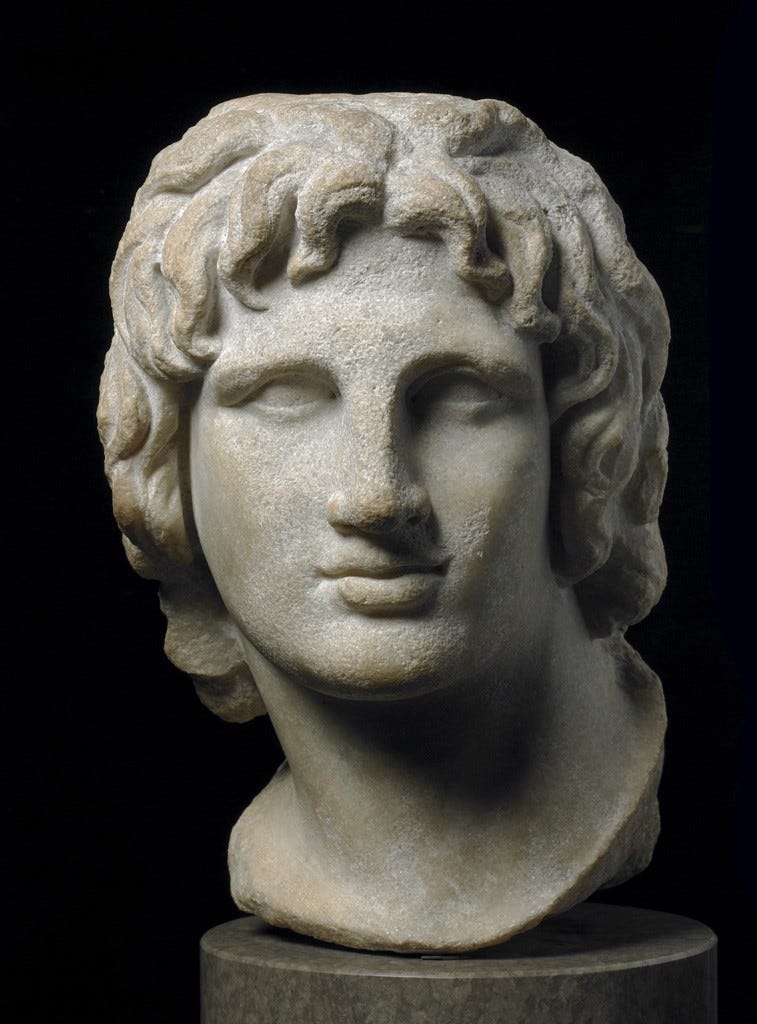

Introduction
In this biographical thesis concerning the most influential human being in the history of the world. Alexander III of Macedon, commonly known as Alexander the Great who existed during the Hellenic era of the Mediterranean. The importance of Alexander the Great’s influence is a legacy that has shaped human history and the humanities for Alexander the Great was the first Globalist in culture and civilization. The life of Alexander the Great must be known for those interested in government and geopolitics for in his life he conquered the entire civilized world, hence why Alexander the Great was the first Globalist. The impacting affect of Alexander the Great’s legacy on human history in how he shaped all future events to unfold due to the accomplishments of his existence.
Alexander III of Macedonia (356–323 BCE) who is commonly referred to as ‘Alexander the Great’ would become King of the Macedonian empire which would span from a civilization in Mediterranean Europe to him becoming Pharaoh of Egypt at 23 years of age in the year 332 BCE, he would become King of Persia at 25 years of age in the year of 330 BCE, he would become King of Asia at 26 years of age in 331 BCE. Despite Alexander the Great being regarded as a ‘Great’ individual, his opponents from his time to historians today would argue that Alexander the Great’s campaign to create a one world order under his rule in hopes to ensure an everlasting global empire which had the ethics and virtues of the Greco-Roman humanities in a universal culture and civilization. Alexander the Great was the first of his caliber of rulers to make his state a superpower and through force, ensure his influence around the civilized world leaving a legacy of being one of the greatest conquerors of all time.
The Birth of a Legend
Alexander the Great was born in the capital of Macedonia in the city of Pella, on the disputed day of either the 20th or 21st of the month of July of the year 356 BCE. He was the son of King Philip II of Macedonia and King Philip II’s fourth and principal wife, Olympias who was a daughter of the King of Eprius. Many purported myths and legends surround Alexander the Great’s birth and adolescence. The ancient Greek biographer known as Plutarch tells a story that in the evening of her consummation of marriage to King Philip II of Macedonia. Alexander’s mother, Olympias had a dream of her womb being struck by lightning which caused a wildfire to spread across the vastness of the world which displayed the prophetic yet cryptic coming of Alexander the Great. Olympias told her dream to King Philip II who believed his son, Alexander to be of divine lineage due to the prodigious nature of Alexander’s proficiency at any thing he wished to endeavor beginning in his youth. This further perplexed King Philip II into wonder for his son, Alexander.
According to the history or legends of antiquity surrounding the legend of the Alexander the Great is that on the day of his birth, his father, King Philip II was preparing to lay siege to the polis of Potidaea when he had received news of a great victory from one of his generals, his skill in raising equestrian stock had come to fruition when his stallions had won in the Olympic Games. Another purported legend is that one of the seven wonders of the ancient world had burned down, this wonder was a temple of Artemis in Ephesus which the cause of such an event was because Artemis had abandoned all her posts to oversee the coming of Alexander the Great. Many of the histories or legends from antiquity surrounding Alexander the Great may have been propagated by Alexander latter in life to show that from conception he was destined for success and glory of the legendary proportions he would accomplish to support his claim of ‘greatness.’

The Greatest Education
King Philip II saw to it to make sure this divine avatar of a being which he saw in his mortal son of Alexander to receive the best education possible so he appointed Aristotle to be the tutor to his principle heir. Alexander started his education at thirteen years of age with his place of academia being the Temple of Nymphs in Mieza. Aristotle is one the great three of the philosophers of ancient Greece with Socrates and Plato being the other two. Socrates’ apt pupil was Plato, Aristotle was a student of Plato, Aristotle is regarded as philosopher who mastered the ideologies of the philosophies of Greece whose legacy is the colloquial term of ‘Aristotelian’ to describe Aristotle’s philosophy which has influenced many religions and his ideas were an influence during the Renaissance era of European civilization. Socrates taught Plato, Plato taught Aristotle, Aristotle taught Alexander the Great, Alexander the Great’s philosophy of conquest impacted the formation of human civilization and culture globally.
The Life of Alexander the Great
Alexander spent his adolescence observing his father’s military might in his campaign to conquer the civilizations of the Mediterranean European world. Alexander the Great’s first taste of military might came at the age of 16 when his schooling with Aristotle came to an end as Alexander was appointed by his father, King Philip II to become Regent as well as the apparent heir to his father’s kingdom of Macedon in his father’s absence as King Philip II went to wage war with a civilization known as Byzantion. During King Philip II’s absence, the Thracians revolted and invaded the sovereign soil of Macedonia. Alexander drove them out and upon his father’s return, King Philip II dispatched Alexander to the lands of Thrace with a small force which neutralized the Thracians, reportedly saving his father’s life. Alexander then began his campaign against other Greek city-states to quell anymore uprisings from the territories in Greece. Alexander rejoined his father King Philip II in a conquest of Greek Polises. Alexander and his father King Philip II waged war against the joint effort of Thebes and Athens which led to an tremendous victory for Alexander and his father King Philip II. At the city of Corinth, King Philip II was declared the supreme commander of Greece who then modeled a Hellenic Alliance modeled after the Delian League which was formed to combat the Persian and outside influences. This new found Hellenic Alliance was known as the ‘League of Corinth’ by scholarly historians which encompassed all of Greece besides Sparta. During this establishment of Macedon as the triumphant party in this succession of power over their lands, future war against Persia was announced as the next stage of King Philip’s conquest. Alexander’s father, King Philip II of Macedonia was a Hellaphile or lover of Greek culture and civilization who with the help of political and military genius of his son Alexander the Great. King Philip II allowed the Greeks to govern themselves autonomously but banned the Greeks from having an independent military that wasn’t controlled by Macedonia. This allowing autonomy would give Alexander the Great the inspiration to allow rulers to continue ruling in dominated kingdoms under the authority of Alexander the Great’s Macedonian empire. This allocation of autonomy helped quell any rebellions within those territories for the current ruler feared the wrath of Alexander the Great.
A series of events which made Alexander question his father’s appointment of him as heir that cemented itself when one of King Philip II’s Generals remarked about Philip II siring a ‘legitimate heir’ at the wedding of King Philip II to Cleopatra, a Macedonian woman of high nobility. The General’s comment of a legitimate heir was one that was of full Macedonian blood. Alexander threw his drink at the General scorning him for calling Alexander a bastard. King Philip II arose, drawing his sword, rushing at Alexander who in his flight tripped and fell.
Alexander the Great then stated this to his father: “Here is the man who was making ready to cross from Europe to Asia, and who cannot even cross from one table to another without losing his balance.”
Alexander and his mother Olympias fled together as they exiled themselves to his mother’s native kingdom of Eprius for six months. King Philip II after realizing what he had done to his most successful potential heir, made abundantly clear by mediation that King Philip II showed no sign of giving up on his political and military genius of a son in Alexander the Great. Many speculate the events which followed in Alexander’s ascension to the throne are surrounded in the enigma of history after King Philip II was assassinated by the Captain of his bodyguards, Pausanias. Pausanias failed to flee the scene as he was taken down by his pursuers who were close friends of Alexander. Olympias, Alexander the Great’s mother placed a bouquet of flowers upon Pausanias’ casket at his funeral. Alexander the Great was made King by the nobles and the military which cemented his place or power and would begin the testament of conquest which is his legacy. That legacy was the idea of a global one world government of culture and civilization that would be repeated by future civilizations. Nothing expresses the Humanities more in our contemporary civilization and culture of our ways of warfare, whether it is the organizations which perpetrate these wars, the industry of creating tools of death and destruction known as weapons to kill our fellow human being from a different culture and civilization, or the academia of strategy in combating our fellow human being from a different culture and civilization. All of these things are relevant today in our colloquial term which is the definition of all the aforementioned aspect of the Humanities known as warfare in the Military Industrial Complex.
The God-King of a Globalist Empire
Alexander the Great, upon his ascension to the throne, methodically ordered the execution of all his public and domestic enemies. King Philip II’s death caused an uprising in the Thracians, the Illyrians, and the Greeks. Alexander the Great quickly quelled this rebellion by starting off by going south to crush the Greeks, then East to eviscerate the Thracians, then back to Macedonia to pulverize the Illyrians, this series of sequential events of battle in the act of absolute domination to restore order all transpired within a single week. Alexander proved not to be one to be meddled against or trifled with, no matter what civilization or its culture was, that society would feel the wrath of Alexander the Great swiftly in brutal methodology. Despite Alexander the Great now in Macedon after his swift campaign to restore immediate order was swept up by the entirety of Greece in a state of rebellion. Alexander and his army dispatched themselves into Greece quickly. Alexander, infuriated by the state of the Greek nation marched 240 miles over the course of two weeks to the city-state of Thebes. The Thebans were set in their hubris that with the help of the other Greek polises would overthrow the Macedonian rule, however, due to the swift discourse of Alexander’s flight into Greece, the other Greek city-states reconsidered their rebellion while Alexander the Great was at their gates. Alexander the Great mercilessly and indiscriminately killed 6,000 men, women, and children. Selling 30,000 citizens of Thebes into slavery. The city was sacked, plundered, decimated, ruined, and razed to the ground with flames into burning rubble leaving only the temples of the Greek pantheon and the house of the poet Pindar remaining in the wake of the brutality that Alexander had shown to the Thebes and the rest of Greece. This brutal display of power showed the rest of the Greeks what exactly they were dealing with and all ideas of rebellion were silenced in sheer horror and fear at the might of Alexander the Great. Greatness does not mean goodness, greatness is to imply immense skill or merit in what one employs in their talents in making them great. Alexander the Great’s greatness was political cunning and military might which had been unparalleled in humanity until now. Nothing had merited the fables concerning tales of Greek heroes and gods until Alexander the Great proved himself to possibly be the amalgamation of both.
Alexander the Great would then begin his campaign of Asia Minor beginning with the Persian Empire. Alexander the Great encountered Persian forces led by King Darius III at a mountain pass in the western asiatic coast. Despite King Darius III’s overwhelming numbers of soldiers, Alexander the Great’s forces defeated the forces of King Darius III with such great decimation at the Battle of Issus that King Darius III fled in panic at the military genius of Alexander the Great. Alexander would go to secure the entire western asiatic coast at the Phoenician and Syrian lands opening the lands to Egypt. Before Alexander the Great entered Egypt, he had received a letter with gifts from King Darius III out of fear of Alexander the Great, hoping they could have a truce which Alexander the Great scoffed at as he entered Egypt to be crowned Pharaoh for Alexander the Great and his Macedonian army comprised of soldiers of the territories he had conquered were viewed as liberators from the Persian Empire which once dominated their lands. This occurred when Alexander the Great was 23 year of age. According to legend, Alexander was pronounced by an oracle to be avatar of Zeus Ammon, whose destiny had been written by the divine to conquer and rule the entire world. Alexander the Great was now acknowledged by society as the god-king he saw himself as. Alexander the Great’s legacy of conquering the entire civilized world to dictate his own idea of a universal culture felt nigh for Alexander the Great as a one world order under a globalist ruling god-king that is himself was at hand as his dream for his globalist society was unfolding in front of him.
Alexander made his way back to Tyre to receive European reinforcements. Alexander then made his way for Babylon to destroy the Persian forces after conquering the lands between the Tigris and the Euphrates. Alexander spotted King Darius III’s forces under the cover of darkness gathered around their campfires on the plains near contemporary Irbil, Iraq. Alexander the Great waited until the next morning of 1, October, 331 BCE where he would do battle with honor with the Persians and their allied forces in hopes to best the Persian forces while both were evenly matched. Alexander not only decimated but destroyed King Darius III’s Persian and Asiatic forces. Alexander the Great would then easily conquer Babylon and the Persian capital of Persepolis. Alexander the Great would be proclaimed the King of Asia. Four months later, Alexander the Great after celebrating with his forces in a fit of drunken debauchery, burned the palace of Persepolis to the ground ending the Persian empire while destroying and looting the Persian capital. King Darius III met his end while in hiding by one of his cousins. Many of Alexander’s days of his early 20’s were filled with debauchery and conquest. Two of Alexander’s constant activities were the consumption of wine and falling societies to seize them as his own throughout the civilized world. Alexander the Great had now conquered everything besides one subtle city-state of Greece that had not joined the League of Corinth originally. The city-state of Sparta rebelled against Macedonia while luckily for Alexander the Great, the Macedonian General, Antipater was in Greece who quelled the Spartans in which 3,500 Macedonians perished while 5,300 Spartans faded from existence into nonentity which included their King Agis. Alexander the Great discovered King Darius III’s corpse which brought forth Alexander the Great’s propagation of his identity and entity as the‘King of Kings,’ a true Ozymandias. Alexander then was caught in a series of executing conspirators plotting his murder from aristocrats in Macedonia as well as making sure those responsible for King Darius III’s death were disposed of. Alexander the Great was beginning his amalgamation of Macedonian and Persian nobility, culture, and civilization.
Alexander the Great began his conquest of India in the spring of 327 BCE. He fought the Indian King Porus along the Hydaspes River where the most greatest and tenacious of battles Alexander the Great had fought took place. Alexander the Great captured King Porus and like the rest of the leaders that Alexander the Great had conquered, he allowed him to live and govern India under Alexander the Great’s permissible higher echelon of supreme ruler. Alexander the Great burned and destroyed many Hindu temples, killing their priests in complete brutality but not in the same degree of severity that Alexander the Great permanently crippled the first monotheistic religion of Zoroastrianism by exacting the immensely more severe brutality upon them. Alexander the Great constructed a navy which sailed the Hydaspes River committing war on the villages, conquering them all along the river to ocean. Alexander the Great was wounded grievously during a battle when an arrow pierced his armor but he miraculously recovered and continued his conquest of the Indian people along the river. His empire then reached all along the Hydaspes to the ocean where they then returned to Persia, traveling westward after the summer of 325 BCE.
Alexander wished to conquer all civilization of the human race to implement a universal culture. In contemporary society, the Alexander the Great is the embodiment of the United States of America with it’s powers of power, force, and influence in the USA’s utilization of authority over the rest of the world. Alexander the Great of the Macedonian Empire. A God-King who became a Globalist who had conquered the East and the West. Alexander the Great was no longer a King of Macedonia but a God-King of a Globalist Empire who was going to unify the Globalist Empire by one homogeneous culture. In accordance to Hegelian Dialectics: Greece was the thesis, the Persians were antithesis. Alexander the Great wished to combine these two cultures into one as the God-King of his Globalist Empire. Alexander the Great held a feat in Persia with Macedonian and Persian intermingled married nobles where Alexander made his proclamation of the Macedonian conquered world and his dream of amalgamating Macedonian and Persian civilization and culture throughout his dominion. Alexander soon after contracted a fever which is believed to have been contracted by either disease or poisoning which became exceedingly greater until he died on 7, June, 323 BCE without any heir apparent his lands were divided among his Generals. Alexander the Great’s legacy is one greater than that of Machiavelli’s “Prince” which is only political philosophy or theory in the Humanities of specifically political science. Alexander the Great created a legacy of legendary proportions as a God-King of a Globalist Empire in application affecting all aspects of humanity for that is why the intellectual elite regard Alexander III of Macedonia to be the most influential individual in the history of the human species.
Sources Cited:
http://www.historyofmacedonia.org/AncientMacedonia/AlexandertheGreat.html
https://en.wikipedia.org/wiki/Alexander_the_Great












